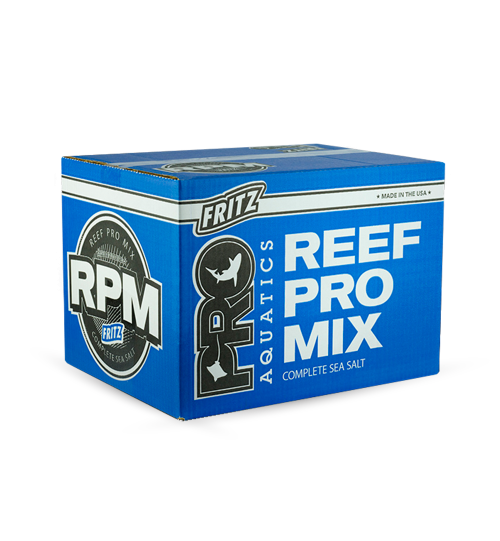About Fritz RPM - Reef Pro Mix
Fritz RPM - Reef Pro Mix is manufactured using only the highest quality raw materials. Formulated by researchers and marine scientists, RPM contains all of the necessary major and minor elements of natural sea water that are utilized by living marine and reef animals. Correct pH and buffering capacity, essential minerals and trace elements have been added in precise ratios to ensure a correctly blended mix for the health and longevity of your livestock.
Parameters:
Salinity: 35 ppt (1.0264 sg)
Calcium: 400-450 ppm
Magnesium: 1300-1400 ppm
Alkalinity: 8.0-9.0 dKH
Strontium: 9 ppm
Potassium: 400 ppm
RPM parameters reflect Fritz Aquatics’ QC pass ranges, the median is targeted. Be aware source water can greatly affect parameters especially alkalinity. QC is conducted using RO/DI at a neutral pH and a TDS of 0.
RPM is manufactured in our own facility in small batches to ensure complete quality control, rather than outsourced to generic chemical blenders with uncertain quality. Our salt blending equipment is devoted solely to the production of aquatic products, preventing contamination issues. Fritz’s unique production process promotes a uniform particle size minimizing stratification of the salts. Each batch is assigned a lot number and tested by in-house quality control to ensure its chemical quality and purity before it is shipped.
RPM is used by public aquariums, zoos, research institutions, destination retail locations, adventure parks and hobbyists worldwide.
Directions & Dosage
MIXING DIRECTIONS
For best results, it is important to follow proper mixing instructions when using salt with elevated parameters like Fritz Aquatics Reef Pro Mix. See below for best practices when using RPM.
When mixing Fritz Reef Pro Mix, it is best to use RO/DI water quality checked by a TDS meter (TDS should be less than 10 ppm, 0 is preferred). Fill a clean mixing container (dedicated to saltwater mixing only) with desired amount of water to be prepared. For best results, use water between 70°-75°F (21°-24°C) when mixing RPM. Slowly add desired amount of RPM to the water to avoid an increase in temperature and precipitation. This helps to prevent precipitation of calcium, alkalinity and other elements. It is recommended to use a mixing pump and an airstone when mixing RPM. This will also help to avoid concentrated areas of material and precipitation. Using a properly calibrated refractometer, bring the water to the desired salinity. Once mixed to a clear solution, add a heater to the water to bring to the current temperature of your aquarium. It is recommended to allow two hours before performing a water change. If water does not mix clear, please contact us for further mixing tips before performing a water change.
DO NOT MIX DRY SALT DIRECTLY INTO SYSTEMS WITH LIVESTOCK PRESENT!
CAUTION: Keep out of reach of children. Not for human consumption. Generates slight heat when added to water; avoid handling with wet hands. Contact with dry powder may cause skin and/or eye irritation. In case of contact, flush eyes with cool water and seek immediate medical attention.
Storage: Store in a cool, dry place. Keep product tightly sealed.
RPM Calculator
Sizes
| Size | Treats | Item Number |
|---|---|---|
| 55 lb. box | 205 gal. @ 30 ppt | 80243 |
| 48 lb. bkt | 180 gal. @ 30 ppt | 80270 |
| 14 lb. bag | 53 gal. @ 30 ppt | 80280 |
FAQs
FAQs
See below for frequently asked questions regarding Fritz RPM - Reef Pro Mix.
-
What is best practice for mixing RPM?
For best results when using salt with elevated parameters like Fritz Aquatics Reef Pro Mix, it is important to follow proper mixing instructions. See below for best practices when using RPM.
1. When mixing Fritz Reef Pro Mix, it is best to use RO/DI water quality checked by a TDS meter (TDS should be less than 10 ppm, 0 is preferred).
2. Fill a clean mixing container (dedicated to saltwater mixing only) with desired amount of water to be prepared. For best results, use water between 70° - 75°F (21° - 24°C) when mixing RPM.
3. Slowly add desired amount of RPM to the water to avoid an increase in temperature and precipitation. This helps to prevent precipitation of calcium, alkalinity and other elements. It is recommended to use a mixing pump and an airstone when mixing RPM. This will also help to avoid concentrated areas of material and precipitation.
4. Using a properly calibrated refractometer, bring the water to the desired salinity.
5. Once mixed to a clear solution, add a heater to the water to bring to the current temperature of your aquarium. It is recommended to allow two hours before performing a water change. If water does not mix clear, please contact us for further mixing tips before performing a water change.Do not mix dry salt directly into systems with livestock present!
CAUTION: Keep out of reach of children. Not for human consumption. Generates slight heat when added to water; avoid handling with wet hands. Contact with dry powder may cause skin and/or eye irritation. In case of contact, flush eyes with cool water and seek immediate medical attention.
Storage: Store in a cool, dry place. Keep product tightly sealed.
Submit a Question
Can't find what you're looking for? Ask us a new question.
